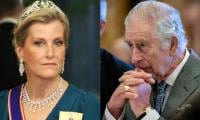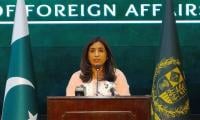ISLAMABAD: Pakistan and Afghanistan say the visit of Chairman of Afghanistan's High Council for National Reconciliation Dr Abdullah Abdullah to Pakistan sees a new chapter opening up in bilateral relations and now is the time for the ongoing Afghan peace process to come to its logical conclusion.
Extending Pakistan’s support for a peaceful, stable, united, sovereign and prosperous Afghanistan, the Afghan dignitary was told that mistakes of the past should not be repeated, nor the past history should dictate the future course of action. A word of caution for Abdullah was that there was a need to guard against the detrimental role of ‘spoilers’, both within and outside Afghanistan, opposed to see peace returning to the region. Abdullah, who started his visit with a meeting with Foreign Minister Shah Mahmood Qureshi at the Ministry of Foreign Affairs on Monday, lauded Pakistan's role in the peace process.
Welcoming Dr. Abdullah Abdullah and his delegation to Pakistan, Qureshi expressed the hope that his visit will open a new chapter in bilateral relations. “Dr. Abdullah Abdullah’s visit will greatly help to strengthen relations with Afghanistan and forge a common understanding on the Afghan peace process. I extend my best wishes to Dr. Abdullah Abdullah in steering the peace negotiations to a successful outcome,” Qureshi was quoted by the Foreign Office saying.
Reaffirming Pakistan’s steadfast support to the peace process, Qureshi emphasized that Pakistan had always maintained that there was no military solution to the Afghan conflict and encouraged all parties to reach a political solution through an Afghan-led and Afghan-owned process.
Pakistan says after the inaugural ceremony of Intra-Afghan negotiations held in Doha on 12 September, it was now up to the Afghan leadership to seize this historic opportunity and secure an inclusive, broad-based and comprehensive political settlement.
Underlining the high importance Pakistan attached to its brotherly relations with Afghanistan, he said recently on the request of the Afghan government, Pakistan had opened five border crossing-points for facilitating transit trade, bilateral trade and pedestrian movement.
Qureshi also highlighted the $1 billion development and capacity-building assistance that Pakistan had extended to support reconstruction and economic development in Afghanistan.
Emphasizing importance of bilateral economic relations, the foreign minister noted that negotiations for Preferential Trade Agreement (PTA) and revision of Afghanistan-Pakistan Transit Trade Agreement (APTTA) would commence soon to optimally utilize our capacities for mutually beneficial trade and transit.
The foreign minister stressed that the repatriation of Afghan with dignity and honour should be part of the peace and reconciliation process.
Highlighting that terrorism was a common threat, the foreign minister emphasized the need for close cooperation through bilateral institutional mechanisms including relevant working groups of APAPPS for effective border management.
Prior to his arrival, Abdullah had stated that the visit would provide a unique opportunity for both sides to exchange views on Afghanistan peace talks in Doha and bilateral relations. “I hope this visit will open a new chapter of mutual cooperation at all levels, especially on achieving a lasting and dignified peace in Afghanistan," he had said on Twitter.
"We have fulfilled our responsibility; now you have to go forward and play your part and I hope that you will be successful," he told the Afghan leadership. "Whatever we can do to facilitate, we have done and will do it." Qureshi said Pakistan backed a peaceful and durable political solution to the Afghan conflict through an Afghan-led and Afghan-owned peace process.
Justice Abdul Shakoor Paracha fixes hearing on December 24 regarding Islamabad constituencies
Police made one arrest after vehicle drove “at least 400 metres across the Christmas market”
Incident occurred when couple, along with their child, was travelling in their car
Congress party dismisses incident as political gimmick
"I am sure once negotiations start, things will move forward," says NA speaker
Discussion focuses on enhancing governance, accountability and functional autonomy within police







